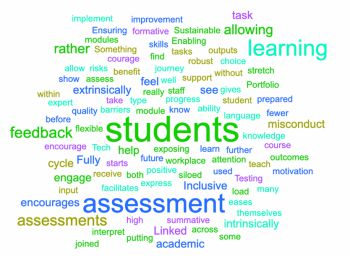Pedagogic Revolution: the future of assessment
By: Maria Balboa Carbon
Last updated: Friday, 11 February 2022


Participants were asked to describe in one sentence how they thought assessment and feedback should look in 5 years’ time.
Almost two years ago, Kelly Coate, Pro Vice-Chancellor for Education and Students, launched the Pedagogical Revolution series as part of our Sussex 2025 Learn to Transform strategy.
Since then, hundreds of teaching staff, senior management and professional services continue to come together in-person and virtually as a community of practice to explore ways to improve pedagogy at Sussex.
The most recent Pedagogic event saw over 80 academic and Professional Services staff attend the sell-out event ‘The Future of Assessment’, held on 19 February. There was a great deal of energy, rich reflections and ideas about how we can transform assessment at Sussex, which resulted in a very productive session.
Teaching staff, senior management and professional services came together to explore the challenges of assessment, review current practices and set clear goals for the future.
Claire Smith, Deputy Pro Vice-Chancellor for Education and Innovation said:
‘This latest Pedagogic Revolution event was yet again full of energy, enthusiasm and a collective desire to evolve our pedagogy, and in this case improve how we do assessments at Sussex.’
‘We know that assessment practices such as feedback, are of great importance for our students, and ensuring that there is a clear understanding of what feedback truly is, rather than just an assignment mark is essential for students to develop their academic and critical thinking – ultimately leading to them reaching their true academic potential. With students at the heart of all we do, the discussions, outcomes and initiatives of this event will help us to accelerate our plans to create assessment practices that will better deliver for students and staff alike.’
The event was an opportunity to share best practice examples of some of the initiatives colleagues are carrying out across the University to make assessments more flexible and inclusive, remove bias in marking and provide effective feedback. Some of the initiatives discussed included offering examples of submitted work, providing appropriate training, setting the assessment as a theory to a real-world problem, using portfolios with optional elements and working with employers in the curriculum
A recurrent topic was the need to ensure students understand what feedback is, distinguishing between explaining the mark and the developmental guidance students receive, as well as the connections between the feedback from one module to the next.
Attendees also had the opportunity to discuss their perspectives of the future of assessment and feedback. Some of the key messages highlighted in the session included:
- Embedding the values of Positivity and Kindness into assessment and feedback, removing the fear usually associated with the process - assessment and feedback should be an opportunity for students to showcase their ability and outputs.
- Setting clear expectations - explaining to students what is being tested (e.g. content, communication, skills, attitude, etc.) and how this will be useful to them for their future and the future of the discipline.
- Inclusive assessments - creating flexible tasks that allow students to express their learning and see their improvement from task to task,
- Sustainable assessments - reducing the number of summative assessments and having more formative ones. Assessments should also be considered from a course perspective rather than siloed within individual modules to have a full understanding of how students experience the assessment cycle.
- Digitally enabled - using technology to facilitate high-quality robust assessment and to ease the administrative load.
- Further embedding employability into assessments - explaining why is valuable to future employers
The Pedagogical Revolutions continues across the University. Colleagues can find information, video clips, slides, resources and the Padlet from the session on the Teaching Online, Learning Anywhere module on Canvas. If you wish to take part, you might need to self-enrol in the module first.